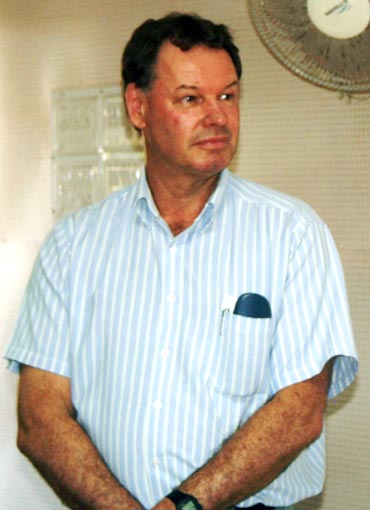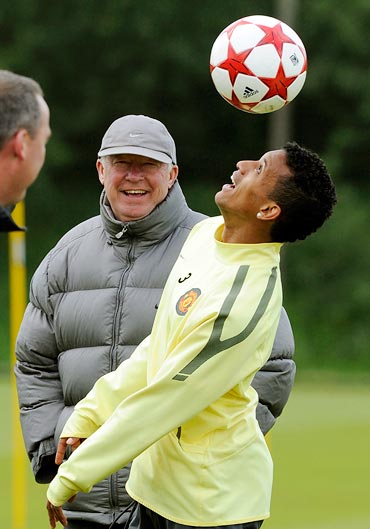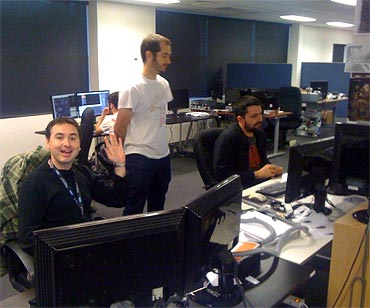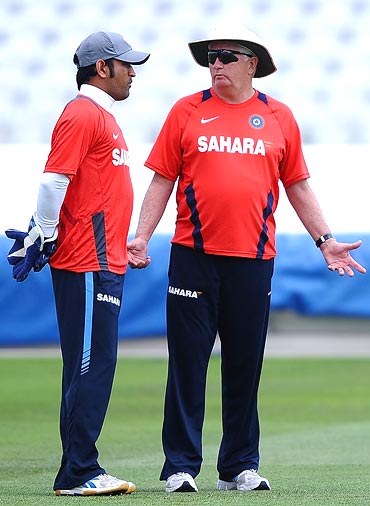
In his recent visit to India, Prof Shilbury, Chair, Sport Management Program, School of Management & Marketing, Deakin University pointed out at the dearth of sports managers in the country and addressed the importance of sports management as a lucrative career option both in India and abroad. Read on.
Why do you think cricket is more popular in India as compared to football or hockey?
Do you think Sachin Tendulkar would have been an international phenomenon had he been playing domestic cricket?
Do you really think sports in India should stop at cricket alone?
Do you think you need to be an athlete to make a career in sports?
These were some of the pointers that Professor David Shilbury wanted students in India to seriously think about.
Prof Shilbury, who was interacting with students of St Xavier's College, Mumbai on September 22, was trying to address the importance of sports management as a viable career option, both in India and abroad.
He went on to offer Australia as an example against India as a better performing nation in sports, including cricket.
While that argument may quite be true, considering that India has only won two World Cups against Australia who've won four, the professor did eventually agree that Sachin Tendulkar was one of the biggest legends that India has produced and concluded that we certainly have much more to achieve as a country, in the field of sports.
Emotions apart, Prof Shilbury made an important point that caught everyone's attention, that "India has all the talent, but India lacks good sports managers".
Divya Nair spoke to him to find out why he thinks so while he reflects about the importance of sports management and the skill sets required to be a successful sports manager.

So, why do you think India needs good sports managers?
Well, I think India definitely has good sporting talent. Every year, we see good numbers of participation in soccer (football), cricket, hockey, athletics, swimming, weight lifting, etc. But come to think of it, you will agree that Indian athletes are not getting their true worth.
The national game of this country is hockey, but cricket is more popular. Cricket has assumed international status in the country and currently, cricket players earn the best remuneration among sportspersons in the country. Why?
Because cricket, in India, has an organised body of activity -- there's a professional involved at every stage of action to ensure that the game is managed efficiently at all levels.
Now imagine that happening to other games as well. Imagine having fancy, well equipped, dedicated clubs in each school and college for a certain sport; one active, governing body at the district, state, national and international level and the right amount of sponsorships. This can be possible only with effective sports management.
The initiative will not only give talented sportspersons a better opportunity to make their mark, but with the involvement of sports managers, the game would certainly gain an impetus in the right direction.
And with the right exposure, a domestic game could go international. This ultimately works not just in the favour of sportspersons, but also puts the country ahead in the international domain.
What does sports management essentially deal with?
Sports management is about planning, organising, staffing, directing and controlling the game.
These are individual departments that fall under sports management and each of these is dealt with in a professional manner.
Click NEXT for more

The skills sets vary from department to department.
What are the courses available under sports management?
There are programmes offered both at graduate as well as post graduate level. Some of the popular courses available would be Bachelor of Sports Development and Bachelor of Exercise and Sports Science.
At the post graduate level, you have Masters of Business in Sports Management. While Australia was among the first to have it, even countries like India have now collaborated with leading Universities to offer the course in their respective cities. So you don't even have to travel to study the course.
Click NEXT for more

There is plenty of scope for sports managers in almost every country. I do not think that sports is niche at all, primarily because pursuing sports is a hobby. And a sport is also about entertainment, which makes it universal.
In India, cricket has been injected and eventually imbibed into the system. However, there are avid followers of international soccer, golf and racing all over the world, even in countries that don't play the sport at all.
Besides, the scope of a sports manager only gets bigger in such countries cause as a sports manager, s/he has lot more things to do for the sport and the nation at large.
Sports managers can find employment in the following areas:
1. Finance and business services
What they do
These managers analyse the cost and revenue involved in the game and find ways and means to better their business.
The scope
The more you bring in business, the better the figures are and correspondingly, the better your prospects in the industry.
2. Legal affairs
What they do
Like every profession; this is to do with issuing, managing and reviewing contracts and handling legal affairs, licensing, etc related to the game and players involved.
The scope
Off late, instances of allegations of players tampering with the game, engaging in misconduct on/off the field or even shifting clubs or teams with the game are on the rise. This is where the legal affairs manager comes into the picture. Also in case of a player's early retirement due to injury, or filing for compensation, the legal affairs manager comes in handy.
3. Public relations
What they do
Like in every other field, the Public Relations' Manager looks after media relations, corporate relations between players, organisers, sponsors and the like. They ensure that the 'right image' is portrayed across the press and in the minds of the audience.
The scope
Today, almost every international sports celebrity has a public relations' executive who accompanies the player at all events and provides updates about the player's activities and achievements. In cases where the player is unavailable or busy, the executive or manager also speaks on his/her behalf and ensures that the good will is maintained.
4. Game developers
What they do
Game developers are like content developers. They discover ways to reinvent the existing game formats (television-based, internet-based, mobile-based, PS2-based etc) and deliver them to the relevant audience.
The scope
As game developers, you give an enthusiast the flexibility of options to follow the game. The more viable, attractive and user-friendly your game is, the better your prospects are.
Now, who had imagined that Angry Birds would be such a raging hit? Was it a national game? Of course, not. But it's popular and infectious. I think, that says a lot about the scope of game developers.
5. Marketing and promotion
What they do
A game is only as good as the market it has. So, as a manger of marketing and promotions, you will be required to market the game among organisers, enable sponsorship from companies like Nike, Reebok, Adidas and the like and thereby create mileage for the game.
The scope
Like any other profession, you will have targets to achieve. The more sponsorship and money you bring in, the better your opportunities you have.
6. Media rights
What they do
If you clearly observe, you will realise that a certain sport or game appears exclusively on one channel. It is the job of media rights department to ensure that the content is available exclusively to a particular channel (for better Television Rating Points) and ensure that it is not copied or broadcast illegally by any other channel. Similarly, if another channel wants to use or share your content (legally), you may also charge them and make profits.
The scope
This is an emerging field and with the addition of new channels of broadcast in television, print and online, there is immense scope and potential.
If you follow soccer (football), you will realise how each of the above department works. You can master the peripherals by choosing any of the above electives as part of your course curriculum at graduate or post graduate level.
Click NEXT for more

I am not sure how it works in India, but I do know that in Australia, there are ample opportunities for sports managers. And yes, there are so many advertisements of job requirements for sports managers (shows some newspaper clippings). These openings are from clubs and athlete training centres.
Do you think the scope of career is better in developed countries?
The beauty of sports is that it is universal. It has no language or culture. However, a lot depends on the country you choose to work in and the popular sport of the country. While employment opportunities are better in developed countries, developing nations are fast catching up. So, the choice is yours.
What is your opinion about the scope of sports managers in India?
I think India has enough manpower, talent and potential. A good sports manager can effectively channelise the above and turn them into a good business and give it back to the country. Anything that will bring revenue to the country is going to be a good thing, right?
Well, at least in a country like India, where the scope of sports mangers is emerging, how would you convince students to take up the profession?
I think it's a lot to do with perception and common belief. Why just India? Even today, parents in Australia are wary about their kids choosing this profession.
But now that they see these advertisements on newspaper, parents are convinced that the vocation is here to stay. This is the case with all new educational programmes -- both parents and students are concerned about the scope and worry about fixed disposable income.
In case of sports management, it's like any other profession. I recently met a student who is working with a leading software company and leads their sports department. Interestingly, the company has a club of its own and promotes its employees towards pursuing it as a serious hobby.
Another student I met was working with a leading sports accessories brand as a consultant cum brand manager. So, the opportunities are vast, you just need to have the right education and skills to grab them.